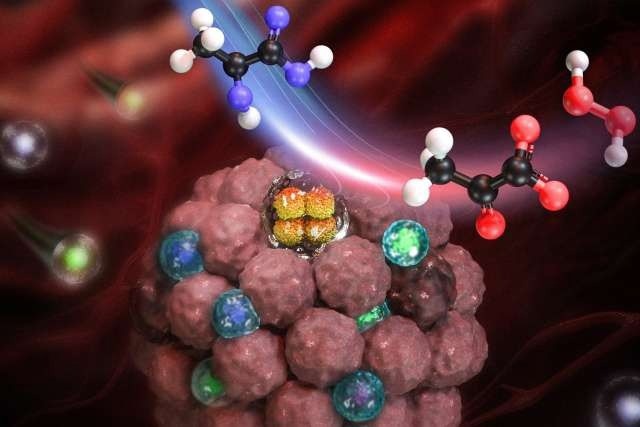The immune response is boosted by a small nanocapsule created by UCLA researchers, making it simpler for the body to fight and eradicate solid tumors.
 Image illustrates the effect of lactate oxidase (LOx) nanocapsules (depicted in orange) within solid tumors. By reducing lactate concentrations and generating hydrogen peroxide in the tumor microenvironment, these nanocapsules promote the infiltration and activation of T cells (depicted in blue and green). Image Credit: University of California, Los Angeles
Image illustrates the effect of lactate oxidase (LOx) nanocapsules (depicted in orange) within solid tumors. By reducing lactate concentrations and generating hydrogen peroxide in the tumor microenvironment, these nanocapsules promote the infiltration and activation of T cells (depicted in blue and green). Image Credit: University of California, Los Angeles
The researchers discovered that the strategy, which was published in the journal Science Translational Medicine, enhanced the quantity and activity of immune cells that fight the disease, improving the efficacy of cancer immunotherapies.
Cancer immunotherapy has reshaped the landscape of cancer treatment. However, not all patients with solid tumors respond well to immunotherapy, and the reason seems to be related to the way the cancer cells affect their surroundings.
Jing Wen, Study Senior Author and Assistant Adjunct Professor, Microbiology, Immunology, & Molecular Genetics, David Geffen School of Medicine, University of California, Los Angeles
Wen noted that since cancer cells produce a lot of lactates, the environment surrounding the solid tumor makes it challenging for the immune system to properly combat the disease.
Although attempts have been made to lower lactate levels using various drug inhibitors, these techniques frequently interfere with the metabolism of healthy cells, which can have extremely adverse reactions.
Wen and the team attempted to develop a technique to directly distribute drug inhibitors to break down lactate around and within solid tumors to ameliorate immune dysfunction without harming healthy cells.
To do that, the scientists created a therapy using a small nanocapsule containing an enzyme called lactate oxidase, which lowers lactate levels and releases hydrogen peroxide in the tumor.
Reduced lactate levels are useful for relieving immunological repression, but elevated levels of hydrogen peroxide, a substance that is created when one is harmed, assist in attracting and activating immune cells in tumors.
When lactate is reduced and hydrogen peroxide is released, it makes it easier for the immune system to work against the cancer.
Zheng Cao, Study First Author and Doctoral Student, Department of Chemical and Biomolecular Engineering, University of California, Los Angeles
The researchers evaluated the technique in mice with melanoma and triple-negative breast cancer and conducted tumor growth measurement, survival curve analysis, RNA sequencing, and immune cell population analysis to investigate the effect of nanocapsules with the lactate oxidase enzyme.
The researchers discovered that lowering lactate and creating hydrogen peroxide encouraged immune cells to infiltrate the tumor, boosting the number and activity of immune cells attacking the malignancy by a factor of two to five.
Cao stated, “We found lactate oxidase nanocapsules helped prevent the immune system from being weakened and overcome the immune suppression caused by the tumor. Moreover, this dual-action approach improved the success of a specific type of cancer immunotherapy treatment called immune checkpoint blockade and we believe it could be an effective strategy to help make cancer immunotherapy more effective.”
Yunfeng Lu, professor emeritus of chemical and biomolecular engineering at UCLA engineering, added, “Built on the drug delivery platform we have developed at UCLA Samueli School of Engineering, this work afforded great translational potentials towards more effective cancer immunotherapy, which may bring new hopes for cancer patients.”
The researchers will examine how lactate oxidate nanocapsules might improve the therapeutic efficacy of chimeric antigen receptor (CAR) T-cell therapy for solid malignancies. CAR T-cell therapy is a sort of cellular immunotherapy that modifies T cells so that they can detect and fight tumors.
Jimin Guo, a former postdoc scholar in the Department of Microbiology, Immunology, and Molecular Genetics, is a Senior Author of this study, along with Wen and Lu.
This research was funded in part by the UCLA ENN Center for Nanomedicine and Energy Conversion, the National Institutes of Health, and the National Center for Advancing Translational Science.
Journal Reference:
Cao, Z., et al. (2023) Lactate oxidase nanocapsules boost T cell immunity and efficacy of cancer immunotherapy. Science Translational Medicine. doi:10.1126/scitranslmed.add2712